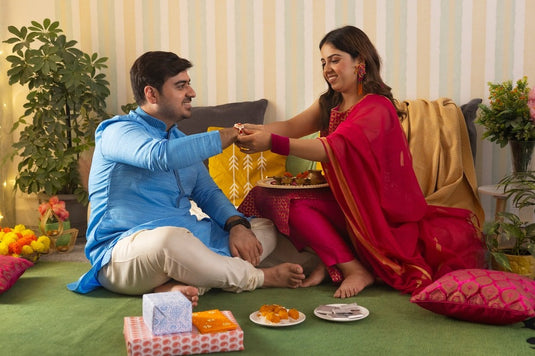Raksha Bandhan, or simply Rakhi, is one of India's most beloved festivals. Honoured with great joy and affection, this festival beautifully showcases the indigenous relationship between brothers and sisters.
Beyond the sweets, paints, and presents, however, there lies a more meaningful tradition brimming with culture and significance. Raksha Bandhan 2025 date and significance are being eagerly searched for by families looking to plan their celebrations in advance, keeping the emotional spirit alive
The Meaning of Raksha Bandhan
The word "Raksha Bandhan" comes from two Sanskrit words: "Raksha", which means protection and "Bandhan", which means bond. It represents a promise of protection in which the sister puts a sacred thread (Rakhi) on her brother's wrist, and the brother promises to guard her against all harm and support her during the ups and downs of life.
But in modern times, the significance of this tie has increased beyond the familial connection. Rakhi is now also associated with cousins, close friends, or even those who have a sibling-like bond, bringing more warmth and inclusiveness to the celebration.
The Significance of Raksha Bandhan

1. Celebration of Love and Protection
At its core, Raksha Bandhan celebrates the unconditional love between siblings. It strengthens familial ties and reminds people of their responsibilities toward one another.
2. Cultural and Religious Value
Traditionally, Raksha Bandhan has various legends associated with it. The most widely shared tale is that of Draupadi tying a corner of her sari to the wrist of wounded Lord Krishna, and in retaliation, Krishna promised to be her raksha for all times to come.
3. Expression of Gratitude and Care
Raksha Bandhan is also not just about a sister looking for protection, but a day for appreciation between siblings. It's a day when brothers and sisters say thanks, reminisce about good times, and reignite emotional bonds despite physical distance between them.
4. Contemporary Interpretations
These days, Raksha Bandhan is changing. Many sisters also give Rakhis to their sisters or tie them around the wrists of soldiers, mentors, and friends. Raksha Bandhan is a festival of recognising anyone who is a protector and caretaker in their lives.

How Raksha Bandhan is Celebrated
Raksha Bandhan is celebrated with great enthusiasm across India and in many parts of the world where Indian communities reside. The celebration is marked by heartfelt rituals, vibrant traditions and a spirit of togetherness. Here's how people typically celebrate Raksha Bandhan :
1. Rakhi Tying Ceremony
The day begins with sisters preparing a Rakhi thali, which includes a decorated plate containing a Rakhi, roli (vermilion), chawal (rice), a diya (lamp), and sweets. Sisters perform an aarti for their brothers, apply a tilak on their foreheads, tie the sacred Rakhi thread on their wrists and pray for their well-being, success and longevity.
2. Exchange of Gifts
After the Rakhi is tied, brothers express their love by giving Raksha Bandhan gifts to their sisters. These can be in the form of cash, clothes, accessories, chocolates, or personalised presents. Today, Raksha Bandhan gift ideas have evolved to include gift hampers, skincare kits, and digital gift cards as well.
3. Traditional Feasts
Like every Indian festival, Raksha Bandhan is incomplete without delicious food. Families prepare or order festive meals, and traditional sweets like laddoos, barfis, gulab jamun, and soan papdi are shared. It’s also common to have a home-cooked lunch or dinner to mark the occasion.
4. Virtual Rakhi Celebrations
With many siblings living in different cities or countries, virtual Raksha Bandhan has become popular. Sisters send Rakhis by courier or use online Rakhi delivery services, and families connect via video calls to perform the rituals together, keeping the tradition alive despite the distance.
5. Lumba Rakhi for Bhabhi
In many regions, especially in North India, Lumba Rakhi is tied by sisters on their sister-in-law’s (bhabhi’s) wrist along with the brother. This symbolises the inclusion of the wife in the Raksha Bandhan bond and emphasises unity within the family.
6. Rakhi for Soldiers and Social Bonds
Beyond family, many people tie Rakhis to soldiers, police officers, and even teachers or mentors as a gesture of respect and gratitude. This expands the idea of Raksha Bandhan as a universal celebration of protection, honour, and love.
Conclusion:
Raksha Bandhan is more than just a traditional Indian festival jewellery ; it's a celebration of the timeless relationship between siblings. The Rakhi is not just a decorative thread but a symbol of love, trust, and the unbreakable bond that siblings share. It embodies the values of Indian culture, such as duty, sacrifice, protection and unconditional affection.
In today’s fast-paced world, relationships are fading away, often lost in the chaos of daily life and digital distractions. But festivals like Raksha Bandhan remind us to pause and appreciate the people who have stood by us through thick and thin. It encourages us to express gratitude, reconnect with our loved ones and uphold the sacred bond of family and emotional support.
As this festival evolves with time, so does its relevance. It’s no longer just about brothers protecting sisters; it’s about mutual respect, equality, and emotional strength in all kinds of relationships. Celebrating Raksha Bandhan today is about honouring all those who protect, support and love us like family.
So this Raksha Bandhan, let’s not only follow tradition but also embrace its true spirit by celebrating connection over distance, emotion over formality, and love above all.



